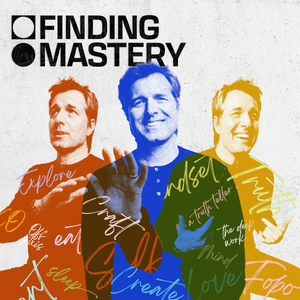
Alcohol: Examining Alcohol culture, history, and use disorder
Explicit content warning
04/14/25 • 94 min
In Episode 15, Preston and Margaret open a bottle—of questions, stories, and science—about alcohol use disorder. What do we get wrong about “moderate” drinking? Why is detox more dangerous than most people realize? And how does alcohol quietly reshape identity, relationships, and the brain itself? With their signature blend of honesty and humor, they explore the unexpected ways drinking shows up in medicine, the myths that keep us stuck, and the messy, meaningful path to redefining recovery.
Takeaways:
What if “just a drink” isn’t so simple? Preston and Margaret explore how subtle patterns can blur the line between social drinking and something more.
Could quitting be more dangerous than drinking? There’s a reason detox needs to be taken seriously—and it’s not what you think.
What does alcohol really do to your brain? Let’s just say it’s a little more complicated than relaxation and red wine.
Why don’t we talk about medication for alcohol use disorder? The answers are as cultural as they are clinical.
Is recovery a destination—or something else entirely? Margaret and Preston unpack a version of success that doesn’t always fit the script.
Watch on YouTube: @itspresro
Listen Anywhere You Podcast: Apple, Spotify, PodChaser, etc.
—
Produced by Dr Glaucomflecken & Human Content
Get in Touch: howtobepatientpod.com
Learn more about your ad choices. Visit megaphone.fm/adchoices
In Episode 15, Preston and Margaret open a bottle—of questions, stories, and science—about alcohol use disorder. What do we get wrong about “moderate” drinking? Why is detox more dangerous than most people realize? And how does alcohol quietly reshape identity, relationships, and the brain itself? With their signature blend of honesty and humor, they explore the unexpected ways drinking shows up in medicine, the myths that keep us stuck, and the messy, meaningful path to redefining recovery.
Takeaways:
What if “just a drink” isn’t so simple? Preston and Margaret explore how subtle patterns can blur the line between social drinking and something more.
Could quitting be more dangerous than drinking? There’s a reason detox needs to be taken seriously—and it’s not what you think.
What does alcohol really do to your brain? Let’s just say it’s a little more complicated than relaxation and red wine.
Why don’t we talk about medication for alcohol use disorder? The answers are as cultural as they are clinical.
Is recovery a destination—or something else entirely? Margaret and Preston unpack a version of success that doesn’t always fit the script.
Watch on YouTube: @itspresro
Listen Anywhere You Podcast: Apple, Spotify, PodChaser, etc.
—
Produced by Dr Glaucomflecken & Human Content
Get in Touch: howtobepatientpod.com
Learn more about your ad choices. Visit megaphone.fm/adchoices
Previous Episode

Social Anxiety & the Loneliness Epidemic
In Episode 14, Preston and Margaret dive into social anxiety disorder and the loneliness epidemic. From embarrassing childhood memories to awkward club encounters, they explore how social anxiety shows up in everyday life and how it differs from normal nerves. They also discuss the surgeon general’s definition of loneliness, the role of social media in increasing perceived judgment, and the neuroscience behind facial recognition, fear responses, and serotonin's impact on the amygdala.
Takeaways:
Social Anxiety Is More Than Shyness: It becomes a disorder when it causes persistent distress, distorted perceptions of judgment, and leads to avoidance of meaningful activities.
Loneliness Is Subjective—and Epidemic: According to the U.S. Surgeon General, loneliness stems not just from solitude but from perceived lack of meaningful connection, and it has major mental and physical health consequences.
Social Media Can Amplify Anxiety: Being constantly seen—and judged—online may intensify social anxiety, even for those who appear confident or well-known.
Your Brain Is Wired to Care: Structures like the amygdala, insula, and anterior cingulate cortex play key roles in social fear, facial recognition, and rejection sensitivity—and they’re all modifiable with therapy and medication.
Healing Is Gradual and Personal: CBT, SSRIs, and compassionate exposure therapy can retrain the brain’s fear circuits—but treatment must match the individual’s goals, beliefs, and readiness for change.
Watch on YouTube: @itspresro
Listen Anywhere You Podcast: Apple, Spotify, PodChaser, etc.
—
Produced by Dr Glaucomflecken & Human Content
Get in Touch: howtobepatientpod.com
Learn more about your ad choices. Visit megaphone.fm/adchoices
Next Episode

Our Favorite Coping Skills for Working in Stressful Times
In Episode 16, Preston and Margaret dive into the chaos of overnight residency, the reality of sleep deprivation, and how mindfulness can backfire when your brain just won’t sit still. From ruined meditations to hot girl walks through hospital hallways, they unpack what real-world coping actually looks like—before, during, and after the hardest moments.
Takeaways:
Coping doesn’t always look like calm. Sometimes it looks like sour gummy worms, a midnight hospital lap, or an espresso ritual that holds your brain together.
Mindfulness is hard—especially when you need it most. Preston and Margaret explore why stillness can feel unbearable and what that reveals.
The ‘right’ tool at the wrong time can make things worse. They break down when distraction works, when it doesn’t, and why guilt shouldn’t be part of the equation.
Safety plans might be broken. What happens when you’re just checking boxes—and how can we make them matter again?
Sometimes the coping skill is just surviving. This episode redefines success as doing what you can with what you’ve got, even if it's messy.
Watch on YouTube: @itspresro
Listen Anywhere You Podcast: Apple, Spotify, PodChaser, etc.
—
Produced by Dr Glaucomflecken & Human Content
Get in Touch: howtobepatientpod.com
Learn more about your ad choices. Visit megaphone.fm/adchoices
If you like this episode you’ll love
Episode Comments
Generate a badge
Get a badge for your website that links back to this episode
<a href="https://goodpods.com/podcasts/how-to-be-patient-605085/alcohol-examining-alcohol-culture-history-and-use-disorder-89626686"> <img src="https://storage.googleapis.com/goodpods-images-bucket/badges/generic-badge-1.svg" alt="listen to alcohol: examining alcohol culture, history, and use disorder on goodpods" style="width: 225px" /> </a>
Copy




